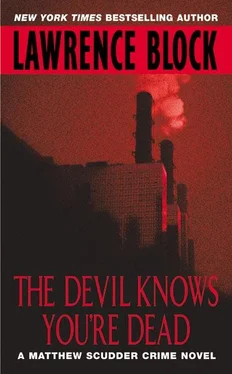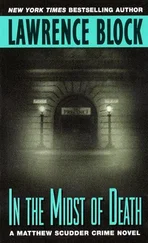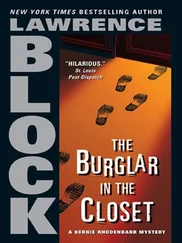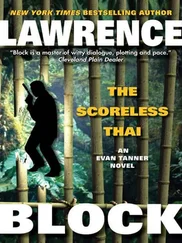“Hey, she had money to pay us,” he said. “You gave me, what, hundred a night for five nights, plus the extra yard for tonight” — I’d given him a bonus for combat duty — “is what, six bills? And how much are you getting, if you don’t mind me asking?”
I admitted I wasn’t getting paid, and told him when he pressed that his wages had come out of my pocket. He asked if she was family. I said no, and he frowned and asked if I was sleeping with her.
I said, “Jesus, Eddie.”
“Well, shit,” he said. “I mean, what are you, the March of fucking Dimes?”
“Lawyers call it ‘pro bono,’ ” I said. “Once in a while I do one for free. She’s a friend of a friend and she’s got no money and you can’t let a shitbag like that walk all over somebody that way.”
“He was a shitbag, all right.”
“So it was easier to help her out than explain why I couldn’t,” I said. “That’s all. I don’t make a habit of it.”
“Shit, I should hope not,” he said. And later, when we were on our way out, he said, “One more time, Matt. You sure you’re not poking her?”
“Yeah, I’m sure,” I said. “And what difference does it make?”
“Well, I was thinking I might try my luck,” he said. “But not if I’d be stepping on your toes.”
“My toes’ll be in another part of town,” I said. “But are you serious?”
“Why not?”
“Well…”
“Look,” he said, “I know she’s a pig. But she’s built nice, and she’s got those sleepy eyes. Hey, I’m not talking love affair. I’d like to do her once, that’s all.”
“Be my guest.”
“Those eyes an’ that mouth. She looks like you could get her to do anything, you know what I mean?”
I was silent for a moment. Then I said, “Just don’t touch the kid.”
“Hey,” he said. “What am I, an animal? Don’t answer that.”
“I won’t.”
“I may be an animal,” he said, “but there’s a limit.”
It wasn’t long after that that I celebrated my anniversary. Another sober year, a day at a time.
An accepted article of AA folk wisdom holds that we tend to experience a lot of anxiety around the anniversary of our last drink, and I suppose it’s generally true. I’d be hard put to say how I felt this time around, and it seemed to me that I had more things to blame it on than my anniversary.
We celebrated the occasion. I qualified at an open meeting at a senior center on Ninth Avenue, and Elaine attended and got to hear me tell my story, and not for the first time. Afterward we went out for dinner with Jim and Beverly Faber.
“You’ll see,” Jim said. “It sneaks up on you. One of these days you’ll wake up and realize you’ve got Long-Term Sobriety.”
“I’ll probably have serenity, too,” I said.
“I don’t know about that. But you might actually have enough time so that you can say you’ve been sober ‘a few twenty-four hours.’ ”
“Never happen.”
Some of the old-timers talk like that. I know a few who never acknowledge their own anniversaries, let alone celebrate the occasion. Just another day, they say, and maybe they’re right.
Elaine and I went back to her place after dinner. We sat up talking for a while, then went to bed and made love. I was just about asleep, just slipping over the edge, and then something woke me. I don’t know what it was. Elaine was lying on her side, facing away from me, her breathing slow and regular. I lay there, not wanting to move for fear of waking her. I hoped I’d drift off, but eventually I had to give up and go in the other room.
I sat on the couch with the lights off and tried to get rid of the thought that was keeping me awake. What I couldn’t stop thinking was that someday I would drink again. It seemed perfectly inevitable to me.
And maybe that’s why the old-timers don’t think in terms of years. Maybe it’s dangerous to take long views, or think long thoughts.
Every three or four days I would stop in at Grogan’s and spend some time with Ballou. I would get there late, near closing time, and we’d sit at a table and drink. Irish whiskey for him, coffee or Coke or club soda for me. The best time was when the customers were gone, and the bartender put up the chairs and swept the floor and went home. Then we’d sit there with all the lights off but one and tell stories and share silences.
He liked the story about my pro bono work in Chelsea.
“You have to hurt the man,” he said. “If you’re not inclined to kill him — and you didn’t want to kill him, did you?”
“No.”
“It’s kill them or throw the fear of God into them, and with some of them killing’s the easier. You can hurt your man and throw a good scare into him, and then he gets drunk or takes some fucking drug and there’s no fear in him. Do you know what I mean?”
“He forgets.”
“That’s it exactly. He forgets that he’s afraid of you. It slips his fucking mind. So you must hurt him badly enough that he simply cannot forget it, he’d sooner forget his own name.”
The words echoed in the still air. In the silence that followed I wondered if it wasn’t simpler to kill, simpler and more certain. Especially if you were a man who killed easily, a man to whom it was second nature. I looked at my friend Mick Ballou, of whom I was uncommonly fond, and thought of another man of whom I had not been fond at all. The silence stretched, and I kept my night thoughts to myself.
When the night ran long, more often than not he’d urge me to join him at mass. He liked to close out the night at the eight o’clock mass at St. Bernard’s on Fourteenth Street. His father had attended that mass every morning, cloaked in his white butcher’s apron, kneeling in the little side chapel, receiving communion before he went off to wield his cleaver a block away.
Mick had his father’s old apron, and he always wore it when he went to mass. He still owned the old man’s cleaver, too, but he left that home. His father had begun each day at the butchers’ mass; Mick would get up from his knees and go off to bed — in one of several apartments around town with a name other than his own on the deed or lease, at the farm upstate, or on the old leather couch in his office at Grogan’s. And, unlike his father, he didn’t ordinarily take communion.
Once, though, we had both stepped up to the altar, had in turn taken the wafer. He’d had the cleaver with him earlier that night, and had cut fresh meat with it. We had both of us bloodied our aprons before standing together in a singular act of sacrilege or piety, as you prefer.
Had my old friend put fresh blood on that apron?
Come to mass with me, he’d urge me now, as the night turned to morning. Not tonight, I’d always say. Another time, perhaps, but not tonight.
Elaine stopped going to her class.
One night we were at dinner and I realized that she was supposed to be in a classroom. I started to say something and she stopped me. “Don’t worry about it,” she said. “I dropped the course.”
“Why?”
“Except I didn’t do anything as formal as drop it. I just stopped going. When you’re not taking these things for credit there’s no point in withdrawing formally. That would be like sending a certified letter to Channel Thirteen telling them you were about to turn off Nova. Why bother? You can just click the remote and watch Roseanne like the rest of America.”
I asked her how come she didn’t want to go anymore.
“I don’t know,” she said.
“Oh.”
“Because it’s bullshit,” she said. “Because I’m such a cliché, another old broad with time on her hands and nothing to do with it, I’m like the lilies of the field, I don’t toil and I don’t spin, and what fucking good am I?”
Читать дальше












